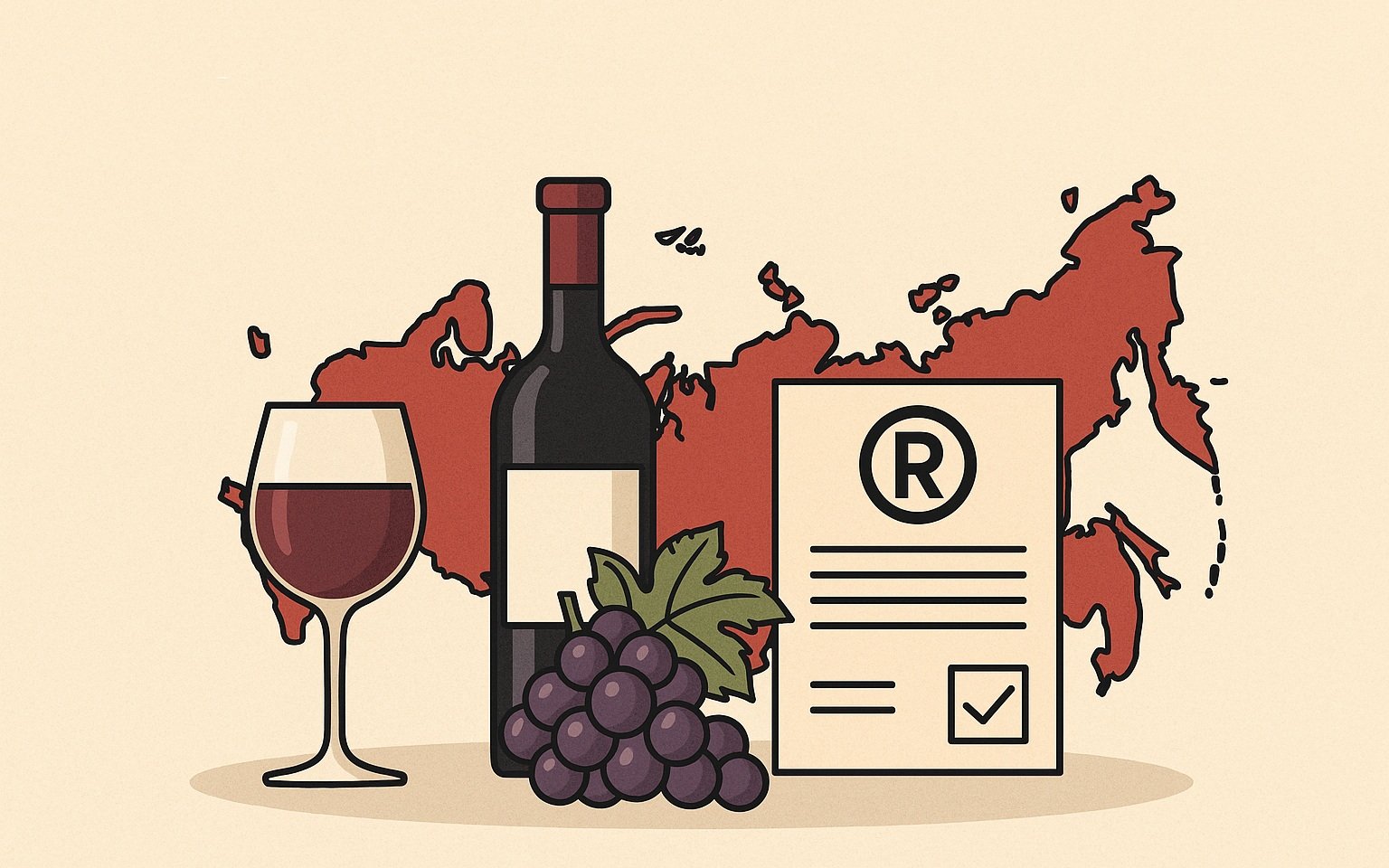We are a legal firm specializing in trademark registration in Russia, with extensive experience assisting foreign brands, including Spanish wineries. The purpose of this article is to explain in detail how to protect a Spanish wine brand in the Russian market: from statistics and risks to the actual filing process, complete with examples and practical recommendations for 2025.
Why Spanish Wine Brands Are Paying More Attention to Registration in Russia
- Foreign applicants are on the rise. According to Rospatent, the number of applications filed by foreign trademark holders under the national procedure grew by almost 20% in 2024 compared to the previous year (.
- Popular categories include food, beverages, alcohol, and packaging. Wineries are high on the list.
- Non-use risk. Under Russian law, a mark may be canceled if not used within a certain period. For wine imports, this is especially relevant: registering without sales could expose the brand to annulment .
The Legal Landscape: Core Rules and Systems
| Law / System | What It Is | Why It Matters to Spanish Wine Brands |
|---|---|---|
| Russian Civil Code, Part IV | Defines trademarks, filing procedures, grounds for refusal, timelines, use, and annulment. | Spanish applicants rely on these provisions as “foreign applicants.” |
| Madrid System (Protocol/Agreement, WIPO) | International system allowing one application to cover multiple jurisdictions (WIPO). | Convenient if the brand already has a Spanish application or registration. |
| Paris Convention Priority | Lets applicants claim the filing date of their home-country application for six months. | Useful for Spanish wineries looking to protect quickly in Russia. |
Challenges Specific to Wineries
- Geographical Indications (GIs) — Rioja, Ribera del Duero, Priorat, etc. If the brand uses such a designation, it must be confirmed as a GI, otherwise conflicts may arise.
- Language and design issues — Wine labels often mix fonts, images, and decorative elements. The mark must not be misleading or confusingly similar under Russian law.
- Packaging as a trademark — Unique bottle or label design can be registered separately, broadening protection.
- Use requirement — Trademarks must be used in Russia; otherwise, competitors may request annulment.
How a Spanish Wine Brand Files in Russia: Our Practical Plan
Here’s how we typically guide wineries through the process.
Step A: Strategy and Clearance
- Search Russian databases (Rospatent) for conflicting marks.
- Check GI registries to confirm whether regional names are protected.
- Decide on route:
- National filing through Rospatent.
- Madrid System extension, if the brand is already filed in Spain.
Step B: Preparing the Application
- Mark description: word, graphic element, colors, possibly label design.
- Classification (Nice, 12th edition 2025): Class 33 (wine, alcoholic beverages), plus others (e.g., Class 35 for retail, Class 43 for tastings/wine tourism).
- Certified translations into Russian.
- Power of attorney for a Russian patent attorney — required for foreign applicants.
- Priority documents if claiming under the Paris Convention.
Step C: Filing Options
| Route | Pros | Cons / Risks |
|---|---|---|
| National filing with Rospatent | Full control, local experts, independent of “basic” mark. | More paperwork, potentially higher costs, average 12–18 months. |
| Madrid System | Efficient, one filing via WIPO, covers multiple countries . | Vulnerable to “central attack” if Spanish basic mark lapses within 5 years; responses may be slower. |
Step D: Examination and Possible Objections
- Formal examination: verifies documents, classes, fees.
- Substantive examination: checks distinctiveness, conflicts, legality.
- Third-party observations: Russian law allows interested parties to submit comments (WTR).
- Grounds for refusal: similarity, misleading use, improper GIs.
Step E: After Registration
- Use the mark in commerce (sales, ads, packaging).
- Monitor for copycats.
- Defend against bad-faith filings: Russia has seen a rise in opportunistic registrations of famous foreign brands.
- Be aware of non-use challenges: competitors can cancel unused marks.
Hypothetical Case: one of the Spanish wine brands: “Bodega del Sol”
Suppose “Bodega del Sol” seeks Russian entry.
- Search shows no conflict in Class 33 (alcohol), only in souvenirs.
- File via Madrid, claiming Classes 33, 35, 43.
- Include label design in the application.
- File a parallel national application in Russia as backup.
FAQ
| Question | Answer |
|---|---|
| Do I need sales in Russia before filing? | No. But post-registration, non-use risks apply. |
| Can I protect just the label? | Yes, as a combined mark (words + graphics). |
| How long does it take? | Typically 12–18 months for national filings. |
| How much does it cost? | Depends on classes, design complexity, attorney fees, and whether you file via Madrid or directly. |
Madrid vs National Filing for Spanish Wine Brands
| Factor | National Filing | Madrid System |
|---|---|---|
| Control | High | Lower, managed via WIPO |
| Dependency on Spain | None | Yes, basic mark must stand 5 years |
| Costs | Higher with many classes | Economical for multi-country coverage |
| Speed | 12–18 months | Centralized but may face delays |
| Label/packaging | Fully specifiable | Limited by base mark’s scope |
Our Recommendations
- File early — secure priority before market entry.
- Invest in quality documents — translations, classifications, design clarity.
- Stay updated on Russian regulations — packaging, labeling, GIs.
- Plan brand use — to avoid non-use cancellation.
- Work with an experienced patent attorney — ideally with wine/alcohol expertise.
Spanish wineries can succeed in Russia with the right legal strategy. Trademark registration is not mere bureaucracy; it’s the foundation for protecting brand identity and reputation.
If you are a Spanish producer eyeing the Russian market, start with a clearance search and strategic filing route. With expert support, you’ll avoid pitfalls and safeguard your label for years to come.
Disclaimer: This article is for informational purposes only. For tailored advice, consult a qualified Russian patent attorney.

Leave a Reply